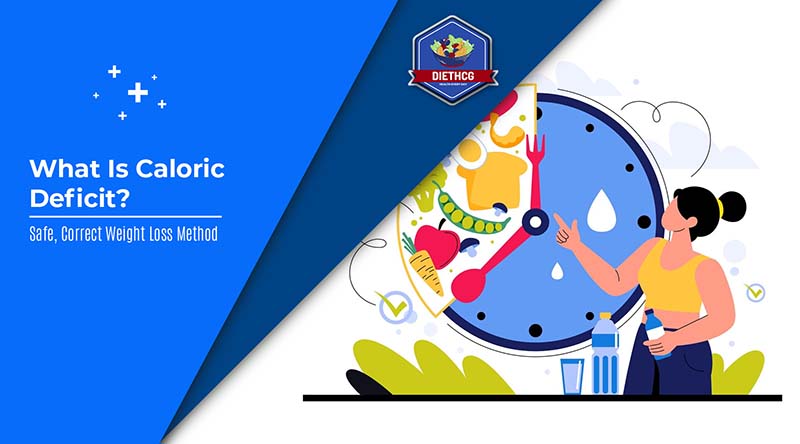What is a caloric deficit? A calorie is a measure of energy, defined as the amount of heat needed to increase the temperature of one gram of water by one degree Celsius. The calories found in food serve as a source of energy, enabling our bodies to perform necessary functions, even when at rest. The sum of all calories burned throughout the day is known as your total daily energy expenditure. To better understand this topic, let’s find out how many calories are considered healthy to consume.

1. What Is a Caloric Deficit? The Significance of Caloric Deficit in Weight Loss
A calorie deficit happens when you eat fewer calories than your body burns. This method is often used for losing weight and keeping it off.
The number of calories a person needs each day depends on things like their gender, age, how active they are, how tall they are, how much they weigh, and what their body is made of.
When you eat more calories than your body needs, the extra energy gets stored as fat, causing weight gain. But if you create a calorie deficit, your body starts using up its fat stores for energy, leading to weight loss.

2. How to Calculate Caloric Deficit
To calculate your calorie deficit, you can use various methods, such as the Harris-Benedict formula. This involves determining your Basal Metabolic Rate (BMR) and activity level.
2.1 How to Calculate the Amount of Calories to Burn
First, you need to know your daily calorie requirement. Once you know your daily calorie requirement, subtract your calorie deficit goal from that number. For example, if your daily calorie need is 1,800 calories and you want a 500-calorie deficit, your new daily calorie target is 1,300 calories (1,800 – 500 = 1,300).
Alternatively, you can find an online calorie burner that does both of these steps together.
2.2 How to Calculate the Level of Caloric Deficit
Determining the average person’s calorie deficit can be done through various methods. For instance, individuals can manually calculate their daily calorie needs or use online calculators.

To manually calculate, moderately active individuals can multiply their current body weight by 15 to estimate their daily calorie requirement. Anything less than this indicates a deficit.
Alternatively, individuals can determine their BMR (Basal Metabolic Rate) using the following formulas based on sex:
- For adult males: BMR = 66 + (6.3 x body weight in lb) + (12.9 x height in inches) – (6.8 x age in years)
- For adult females: BMR = 655 + (4.3 x weight in lb) + (4.7 x height in inches) – (4.7 x age in years)
Once the BMR is calculated, individuals can use their activity levels to determine their caloric needs by multiplying their BMR by a corresponding activity factor:
- Sedentary: BMR x 1.2
- Minimally active: BMR x 1.375
- Moderately active: BMR x 1.55
- Very active: BMR x 1.725
- Extra active: BMR x 1.9
2.3 Safe Level of Caloric Deficit as Recommended by Experts
Experts generally recommend aiming for a daily caloric deficit of around 500 calories as a safe level for weight loss. This deficit can lead to losing approximately 1 pound per week. It’s crucial not to consume less than 1,200 calories a day for women and 1,500 calories a day for men to maintain health and avoid metabolic slowdown.
Creating a caloric deficit involves consuming fewer calories than you burn through activities and bodily functions. You need to focus on nutrient-rich foods, drink enough water, and exercise regularly while maintaining a moderate calorie deficit.
Additionally, it’s advised not to lose more than 1-2 pounds per week to avoid potential health issues associated with insufficient calorie intake. Monitoring progress, adjusting calorie intake as weight changes, and seeking expert advice if weight loss stalls are essential steps in a safe and effective weight loss journey.
3. Who Should Not Implement a Caloric Deficit
People who shouldn’t try a caloric deficit are those who need at least 1,200 calories a day if they’re women, and 1,500 calories a day if they’re men, to stay healthy and energized. Eating less than these minimum amounts can make you feel tired and may cause you to miss out on important nutrients. Also, if you’re pregnant, breastfeeding, or have certain health issues, it’s smart to talk to a doctor before changing how much you eat. Think of your health first when thinking about losing weight by cutting calories.
4. How to Achieve a Caloric Deficit
You can create a calorie deficit by consuming fewer calories, increasing your physical activity levels, or both. Combining a calorie deficit with regular physical activity might be a more sustainable, safe, and effective approach to weight loss.

4.1 Reduce Caloric Intake
One way to achieve a calorie deficit is by changing your daily food and drink choices. Focus on foods that are packed with nutrients but have fewer calories. According to the Dietary Guidelines for Americans 2020–2025, a healthy eating plan with fewer calories should include:
- Whole vegetables
- Whole grains
- Whole fruits
- Lean proteins
- Low-fat or fat-free dairy products like milk, yogurt, cheese, or fortified soy beverages
- Healthy oils such as olive or canola
Additionally, avoid consuming sugary drinks and trans fats.
4.2 Physical Activity
Regular physical activity offers numerous benefits, including weight loss.
According to the Physical Activity Guidelines for Americans, adults should aim for 150–300 minutes of moderate-intensity exercise or 75–150 minutes of vigorous-intensity exercise each week. Moderate-intensity activities may include brisk walking, light bicycling, and yoga, while vigorous-intensity activities may include jogging and fast bicycling.
It’s also recommended to engage in muscle-strengthening activities targeting major muscle groups like the back, shoulders, chest, arms, and legs at least two days per week. Strengthening exercises can help your body prioritize burning body fat over muscle mass.
5. Why Am I Not Losing Weight Despite a Caloric Deficit?
It might seem simple that eating less than you burn should lead to weight loss, but there are other factors that could be getting in the way. These factors affect your metabolism and include:
- Medications: Some meds can make it harder to lose weight or even cause weight gain. Examples include certain birth control pills, antidepressants, antipsychotics, and diabetes medications like insulin.
- Poor sleep: Not getting enough sleep messes with your cortisol levels, which can affect your metabolism.
- Stress: Being stressed for a long time can also throw off your cortisol levels, impacting metabolism just like poor sleep.
- Menopause: Hormonal changes during menopause can mess with your body chemistry, affecting metabolism.
- Underlying conditions: Conditions like polycystic ovary syndrome (PCOS) and metabolic syndrome can make it tough to lose weight by affecting metabolism. Even conditions like sleep apnea, which messes with sleep, can make it hard to drop weight.
- Eating too little: It sounds odd, but eating too few calories can sometimes make it hard to lose weight. A super low-calorie diet can slow down your metabolism.
Pic
6. Dietary Considerations When Aiming for a Caloric Deficit
When striving to lose weight, managing your calorie intake is important. A calorie deficit occurs when you consume fewer calories than your body uses. While this can facilitate weight loss, you should approach it wisely to get healthy and long-lasting results.
6.1 Does Eating Less Speed Up Weight Loss?
Reducing your food intake can indeed accelerate weight loss by creating a caloric deficit. However, the quality and quantity of your meals still matter. You should maintain a balanced, nutritious diet to meet your body’s needs, even when cutting back on calories. Eating too little can result in nutrient deficiencies, muscle loss, and a sluggish metabolism, which may impede your weight loss journey.

6.2 How Much of a Caloric Deficit Is Needed to Lose 1kg?
Typically, shedding 1kg requires a caloric deficit of about 7,700 calories. This is because each kilogram of body weight equals approximately 7,700 calories. A safe and sustainable weight loss rate is generally considered to be around 0.5 to 1 kg per week, achievable by establishing a daily caloric deficit of 500 to 1,000 calories.
6.3 Do Not Cut Too Much Protein
Protein is vital for preserving muscle mass, particularly when undergoing a caloric deficit. Muscle tissue is metabolically active, aiding in calorie burning even at rest. Maintaining sufficient protein intake helps safeguard muscle mass during weight loss, promoting a better appearance, enhanced well-being, and a more active metabolism.
6.4 How to Calculate the Amount of Protein Needed for Physical Activity
Your protein requirements hinge on your activity level, weight, and muscle mass. A general guideline is to consume 1.2 to 2.0 grams of protein per kilogram of body weight daily if you’re active. For instance, someone weighing 70 kg might require between 84 to 140 grams of protein daily, depending on their activity level and fitness objectives.
6.5 Do Not Cut Too Many Calories
While a caloric deficit is crucial for shedding pounds, excessive calorie reduction can backfire. Severe restriction may lead to a notable drop in metabolism, muscle loss, nutrient deficiencies, and eventually, a weight loss plateau. It’s essential to strike a balance that supports steady, sustainable weight loss while ensuring your body receives the nutrients it needs for proper function and overall well-being.
7. Conclusion
In summary, understanding “What is caloric deficit” is important for successful weight loss. By consuming fewer calories than your body needs, you create a deficit that prompts fat loss over time. However, this method must be approached wisely, ensuring you maintain a balanced diet and get enough protein to maintain muscle mass and support overall health.
We’d love to hear about your experiences with caloric deficit and weight loss! Feel free to share your stories and feedback in the comments section below. And don’t forget to explore more insightful blogs on weight loss, health, and nutrition from DietHCG. Happy reading!


